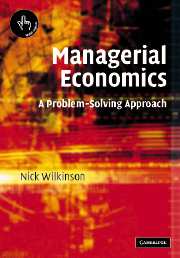Book contents
- Frontmatter
- Contents
- Preface
- Acknowledgements
- Detailed contents
- PART I INTRODUCTION
- PART II DEMAND ANALYSIS
- PART III PRODUCTION AND COST ANALYSIS
- PART IV STRATEGY ANALYSIS
- Chapter 8 Market structure and pricing
- Chapter 9 Game theory
- Chapter 10 Pricing strategy
- Chapter 11 Investment analysis
- Chapter 12 Government and managerial policy
- Index
Chapter 9 - Game theory
Published online by Cambridge University Press: 05 June 2012
- Frontmatter
- Contents
- Preface
- Acknowledgements
- Detailed contents
- PART I INTRODUCTION
- PART II DEMAND ANALYSIS
- PART III PRODUCTION AND COST ANALYSIS
- PART IV STRATEGY ANALYSIS
- Chapter 8 Market structure and pricing
- Chapter 9 Game theory
- Chapter 10 Pricing strategy
- Chapter 11 Investment analysis
- Chapter 12 Government and managerial policy
- Index
Summary
Objectives
To define and explain the significance of strategic behaviour.
To explain the characteristics of different types of games and show how differences in these characteristics affect the behaviour of firms.
To examine the various concepts of equilibrium in terms of strategies.
To examine the concepts of Cournot and Bertrand competition.
To explain the relationships between static and dynamic games.
To explain the solution of dynamic games using the backward induction method.
To explain the importance of strategic moves and commitment.
To discuss the concept of credibility and the factors which determine it.
To examine games with uncertain outcomes and explain different approaches to their solution.
To examine repeated games and how their nature leads to different solutions from one-shot games.
To examine a variety of different applications, in order to relate game theory concepts to much of the other material in the book.
To demonstrate how game theory explains much firm behaviour that cannot be explained by traditional analysis.
To stress that many of the conclusions of game theory are counter-intuitive.
Introduction
In the previous chapter we have indicated that oligopoly is in practice the most common form of market structure. Most of the products that people consume, from cars to consumer electronics, cigarettes to cereals, domestic appliances to detergents, and national newspapers to athletic shoes, are supplied in oligopolistic markets. This also applies to many services, like supermarket retailing, travel agencies and, at least in the UK, commercial banking.
- Type
- Chapter
- Information
- Managerial EconomicsA Problem-Solving Approach, pp. 331 - 381Publisher: Cambridge University PressPrint publication year: 2005



